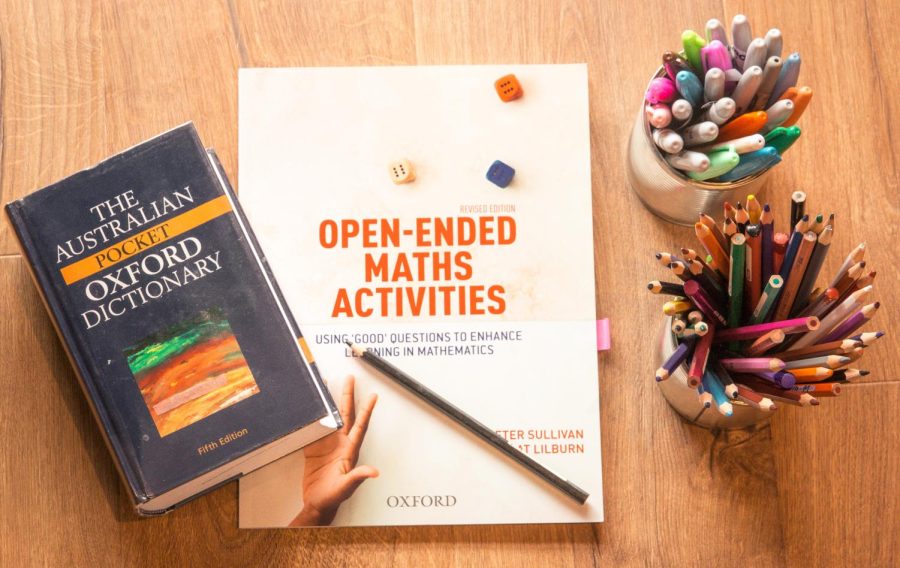Advice for AP Courses at Green Hope (STEM Edition)
Samir Imparts His Wisdom on AP STEM Courses
Photo by Lewis Keegan on Unsplash
Assignments will pile up quickly if they are not quickly addressed and completed
February 13, 2022
With the new semester starting, you may be wondering how you should go about preparing for your new AP courses. Whether you have never taken an AP class before or you have only taken them in a virtual environment, it is best to go into these courses with the study habits and skills you need to succeed. With that being said, here is some advice we have for some of the advanced STEM courses offered at Green Hope.
Calculus AB
When I took this class junior year, I realized that the teaching style was a bit different from my previous math courses. You should expect to spend a day on each lesson, so you must take the time to understand each concept that you go over before the next day. I highly recommend doing all of the homework that the teacher gives you (even if it is optional) as it will ensure that you have mastered the concepts for that lesson.
To do well in the class, I made sure to organize my notes for each unit in a way that let me go back to them easily. I also made a one-pager on the most important concepts and formulas that I needed to remember, which let me have a review sheet for the day of the test. I also took advantage of all of the resources they gave including the progress checks on AP Classroom and the optional homework assignments which were composed of handout sheets and textbook work.
The best advice that I can give is to not let one bad grade hold you down. I started with lower test scores in the beginning due to the foreign teaching style and rigor, but I eventually got used to it and brought my grades back up.
Calculus BC
I personally did not take this course, but Benjamin Yan, a current senior, has provided some insight on his experience with the class last year. “My biggest piece of advice is before going into the AB-BC track, you have to have a strong foundation for your Precalc and Math 3 content,” he stated. “Same thing for BC; before heading into BC, make sure you’ve mastered AB concepts because I think the biggest reason people struggle in BC is because they’re lacking understanding not in the BC concepts but in the fundamental, AB, precalc, trig, and algebra concepts.” In other words, Calculus BC builds off of the concepts taught in the previous math courses, so the first thing you can do to prepare yourself for success is ensuring that you have mastered the material from the previous courses.
To study for the class, it is important to take advantage of all of the practice assignments, including the progress checks that you are given. “I think the biggest thing was doing textbook homework every day. Practice makes perfect!” Yan stated.
Physics 1: Algebra-Based
Throughout high school, I would say AP Physics was one of the toughest courses I have taken. I heard the many rumors about the difficulty of the class, which kept me in a nervous state of mind from day one. And just like my experience in Calculus, I initially struggled with the tests but eventually got used to the general format and types of questions to expect.
For this course, the most important thing that you can do to succeed in taking advantage of all of the assignments you are given. This class isn’t super note-heavy, and sometimes you may even finish all of the notes in one day; the main objective is to understand how to apply the concepts and formulas you learn to more difficult problems. It also helps to read the textbook to get a hang of the conceptual questions that you might see and use the designated conceptual problems for the unit at the end of each chapter.
As for the labs, it is important to put in your best effort into them as they can help balance out your grade if you find yourself struggling with the tests. Some of the labs are fairly straightforward while others may be a bit more complex, but it is certainly possible to get a high enough grade on each one to compensate for a lower test grade.
Statistics
Statistics was one of the AP courses that I enjoyed, especially since the content is very applicable to your daily life. In terms of difficulty, I would say that this class can go either way for some people as it leans more towards the conceptual side.
In order to adequately prepare for this class, I highly recommend doing the pages from the homework packet, and most of the points on the FRQs come down to how well you can interpret the information you obtain from your calculations. This is why you may hear some people think of Statistics as an English class, which is mostly due to the heavy emphasis on writing.
For some of the units, you will have a lab to apply everything you learned in the unit. This way, you are ensuring that you understand the information that you are being given as it is common for people taking the course to understand the math but not the meaning.
Another method of studying that I would highly recommend is referencing multiple-choice questions online. This way, you will be able to get a feel of the conceptual questions that you may see, and some of them may even be similar to the ones you see on the tests. Bottom line, when it comes to Statistics, practice is essential!
Earth & Environmental Science
AP Earth and Environmental Science is one of the courses that does well in introducing you to the rigor of AP classes. “This course is generally considered as one of the less difficult AP classes. However, it is a class that has a moderate workload,” stated Dylan Shukla, a senior at Green Hope. “Labs are assigned often and tests and papers are major influences to your course grade,” he added.
To study for this course, just like many other AP courses, utilizing all of the assignments and resources offered is essential. “I made sure to stay up-to-date with the assigned chapters. Writing down notes of the chapters helped me with understanding and remembering the content better. Before each test, I would take the online chapter quizzes, which was highly beneficial in preparation for the test,” Dylan said.
In terms of preparing for the tests and the FRQs on the AP Exam, it is essential to maintain optimal note-taking skills and have a solid understanding of the material in context. “The main topics align closely with what is on the tests, along with the chapter quizzes. Try to pay attention to the vocabulary used in your teacher’s notes or the chapters,” Dylan advises. “Understanding the context of the vocabulary will give you an advantage for tests and will help you create nuanced responses for the FRQ portion of the tests and even the AP Exam,” he added.
AP Chemistry
AP Chemistry is notorious for being one of the most difficult courses at Green Hope. Sashank Ganapathiraju, a senior at Green Hope, touched on his experience with this course, citing the rigorous workload in addition to the difficult tests. “On a scale of 1-10, 10 being the hardest, this class is a 15. Pushing through all of the content that AP Chem covers in just a semester requires a high level of commitment to understanding concepts and techniques to analyze problems,” he stated. Lab reports are probably the most difficult part of the course, so make sure you start early,” he added.
In terms of starting off the course strong and ensuring success, Sashank recommended a multitude of resources and strategies to help students adjust to the rigor of the course. “Doing the textbook problems that are assigned is probably the #1 thing that helped me, besides praying. I also worked with other students in the class to collaboratively take notes on our guided notes packet during class, and studied them religiously in the days leading up to the test. Khan Academy practice really helps too, because there are review questions for every unit up there,” he advised.
Just like with many AP courses, Sashank’s #1 advice is to not procrastinate and to get to know your classmates to have other people to work and study with. By doing this, you have other people to look to when you have questions, helping you avoid falling behind as the course itself is fairly fast-paced.












































































